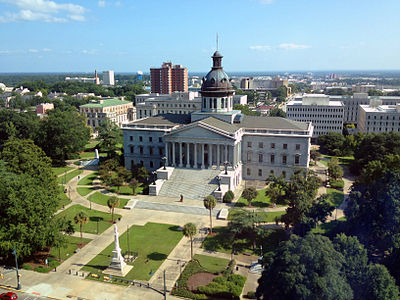
Search
South Carolina Statehouse corruption investigation

The South Carolina Statehouse corruption investigation was a probe into unlawful interactions between members of the South Carolina General Assembly, the political firm of Richard Quinn, Sr., and major state institutions and corporations from 2013 to 2021. The influence of Quinn's consulting firm was called the Quinndom. By the end of the investigation, four members of the South Carolina General Assembly were indicted on public corruption charges. This investigation is often considered the most significant political scandal in the history of the state of South Carolina since Operation Lost Trust in 1989. Lost Trust directly influenced the passing of South Carolina's Ethics Reform Act of 1991, and led to the restructuring of the state government in 1993. The investigation raised questions about the effectiveness of that reform in the face of political corruption and dark money influence.
Investigation timeline
In 2013, a report on the campaign spending of House Speaker Bobby Harrell was submitted to the Attorney General of South Carolina by the South Carolina Law Enforcement Division (SLED). Based on this report, a State Grand Jury investigation was initiated, but attorneys for Harrell called for the recusal of Attorney General Alan Wilson. Wilson designated solicitor David Pascoe to act as special prosecutor.
In 2014, Harrell was indicted, removed from office and sentenced after a guilty plea of multiple state ethics law violations. Additional legislators were named in the SLED report, and Pascoe sent a request to the Attorney General for expansion of the corruption probe to include these individuals.
In 2015, almost nine months after Pascoe’s request, the Attorney General communicated to SLED that their report should be sent to Pascoe for determination on how to prosecute.
In 2016, a case initiation form by Pascoe and SLED Chief Mark Keel referred the case to the State Grand Jury. The Attorney General argued that only he as the elected officer could sign the form, and that Pascoe had no standing, and fired Pascoe from the case. In response, Pascoe petitioned the South Carolina Supreme Court calling for a decision on his vested authority to move forward with the investigation. On June 16, the case was heard before the Supreme Court, Pascoe arguing his own case. The Court ruled in favor of Pascoe, giving him “full authority to act as the Attorney General for purposes of the investigation.” From there, members of the State Grand Jury were selected and the investigation proceeded.
Indictments
- Bobby Harrell, former Speaker of the House, pled guilty to six counts, and resigned from his seat in the House.
- James H. Merrill, former member of the South Carolina House of Representatives, pled guilty to misconduct.
- John Courson, former member of the South Carolina Senate, resigned from his seat in the senate and pled guilty to misconduct in office.
- Jim Harrison,former member of the South Carolina House of Representatives, pled guilty and received jail time.
- Tracy Edge, former member of the South Carolina House of Representatives, was indicted for misconduct.
- Rick Quinn Jr., former member of the South Carolina House of Representatives, pled guilty to public corruption.
- Richard Quinn, former consultant, pled guilty to lying to a grand jury and obstruction of justice.
Aftermath
Legislative action
Mandy Powers Norrell and Gary Clary, former members of the South Carolina House of Representatives, introduced a campaign finance and ethics reform bill in January 2017. The bill had a hearing by the House Judiciary Committee, but was not advanced.
Publication of State Grand Jury Report
In October 2018, South Carolina Circuit Court Judge Clifton Newman ruled that the request to publish the State Grand Jury Report on the public corruption investigation should be approved. The State newspaper joined Pascoe in arguing before the court that the report should be made public.
Impacts on actions by the governor
Governor Henry McMaster was among other public officials and corporate heads who contracted with Richard Quinn's consulting business. While he was not implicated in the corruption probe, McMaster was not immediately able to appoint replacements to retiring board members of the South Carolina Ports Authority (SCPA). The authority also contracted with Richard Quinn. After SCPA ended their contracts with Quinn, the state legislature allowed the appointments to go forward. McMaster subsequently ended his contract with Quinn.
Corporate accountability
Five corporations — the University of South Carolina, AT&T, SCANA, Palmetto Health, and the South Carolina Alliance for Justice — signed corporate integrity agreements with Pascoe to pay a fine and admit no wrongdoing in exchange for no prosecution.
References
External links
- Unredacted 28th State Grand Jury Report May 13, 2020.
- Ethics, Government Accountability, and Campaign Reform by South Carolina General Assembly
- H.3514 Candidates and Elected Officials, introduced January 18, 2017
- Attorneys Comment on Supreme Court ruling on Attorney General Case, June 16, 2016 with The State Newspaper
- "What can we do to fix corruption in South Carolina?" March 6, 2022 with The Post and Courier
Text submitted to CC-BY-SA license. Source: South Carolina Statehouse corruption investigation by Wikipedia (Historical)
Owlapps.net - since 2012 - Les chouettes applications du hibou



